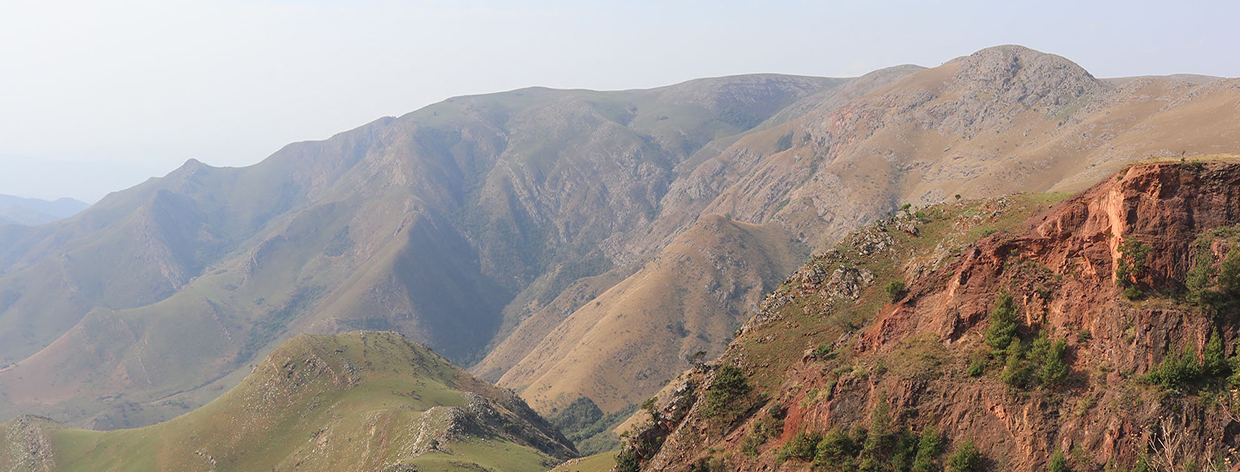The Forgotten Kingdom.
New investigations in the prehistory of Eswatini
https://doi.org/10.34780/7510-t906
摘要
The kingdom of Eswatini provides a rich archaeological sequence covering all time periods from the Early Stone Age to the Iron Age. For over 27 years though, no or very little archaeological research was conducted in the country. In the scope of a new project funded by the German Research Foundation (DFG) we aim to re-excavate and re-date Lion Cavern, the potentially oldest ochre mine in the world. In addition, we conduct a largescale geological survey for outcrops of ochre and test their geochemical signatures for comparative studies with archaeological ochre pieces from MSA and LSA assemblages in Eswatini. Here we present a review of the research history of the kingdom and some preliminary results from our ongoing project.
关键词:
Eswatini, Lion Cavern, Ochre, Provenance tracing
参考
Barham, L. S. 1989a The Later Stone Age of Swaziland. University of Pennsylvania.
Barham, L. S. 1989b A Preliminary Report on the Later Stone Age Artefacts from Siphiso Shelter in Swaziland. In: The South African Archaeological Bulletin 44: 33–43. doi: https://doi.org/10.2307/3888317
Barham, L. S. 1998 Possible Early Pigment Use in South‐Central Africa. In: Current Anthropology 39: 703–710. doi: https://doi.org/10.1086/204793
Barham, L. S. 2002 Systematic Pigment Use in the Middle Pleistocene of South‐Central Africa. In: Current Anthropology 43: 181–190. doi: https://doi.org/10.1086/338292
Beaumont, P. 1978 Border Cave. University of Cape Town.
Boshier, A. / Beaumont, P. 1972 Mining in South Africa and the emergence of modern man. In: Optima 22: 2–12.
Dart, R. / Beaumont, P. 1971 On a further radiocarbon date for ancient mining in southern Africa. In: South African Journal of Science 67: 10–11.
Dayet, L. / Le Bourdonnec, F. X. / Daniel, F. et al. 2016 Ochre Provenance and Procurement Strategies During The Middle Stone Age at Diepkloof Rock Shelter, South Africa. In: Archaeometry 58: 807–829. doi: https://doi.org/10.1111/arcm.12202
Goodwin, A. J. H. / van Riet Lowe, C. 1929 The Stone Age cultures of South Africa. In: Annals of the South African Museum 27: 1–289.
Henshilwood, C. S. / Sealy, J. C. / Yates, R. et al. 2001 Blombos Cave, Southern Cape, South Africa: Preliminary Report on the 1992–1999 Excavations of the Middle Stone Age Levels. In: Journal of Archaeological Science 28: 421–448. doi: http://dx.doi.org/10.1006/jasc.2000.0638
Price Williams, D. 1981 A Preliminary Report on Recent Excavations of Middle and Late Stone Age Levels at Sibebe Shelter, North-West Swaziland. In: The South African Archaeological Bulletin 36: 22–28. doi: https://doi.org/10.2307/3888015
Price Williams, D. 2016 Gazing upon sheba’s brast. Exploring our african origins. Markosia.
Rifkin, R. F. 2011 Assessing the Efficacy of Red Ochre as a Prehistoric Hide Tanning Ingredient. In: Journal of African Archaeology 9: 131–158. doi: https://doi.org/10.3213/2191-5784-10199
Rifkin, R. F. / d’Errico, F. / Dayet-Boulliot, L. et al. 2015 Assessing the photoprotective effects of red ochre on human skin by in vitro laboratory experiments. In: South African Journal of Science 111: 1–8.
Wadley, L. 2005 Putting ochre to the test: replication studies of adhesives that may have been used for hafting tools in the Middle Stone Age. In: Journal of Human Evolution 49: 587–601. doi: http://dx.doi.org/10.1016/j.jhevol.2005.06.007
Wadley, L. / Hodgskiss, T. / Grant, M. 2009 Implications for complex cognition from the hafting of tools with compound adhesives in the Middle Stone Age, South Africa. In: Proceedings of the National Academy of Sciences 106: 9590.
Wadley, L. / Williamson, B. / Lombard, M. 2004 Ochre in hafting in Middle Stone Age southern Africa: a practical role. In: Antiquity 78: 661–675. doi: https://doi.org/10.1017/S0003598X00113298
Watts, I. 2009 Red ochre, body painting, and language: interpreting the Blombos ochre. The cradle of language 2: 93–129.





